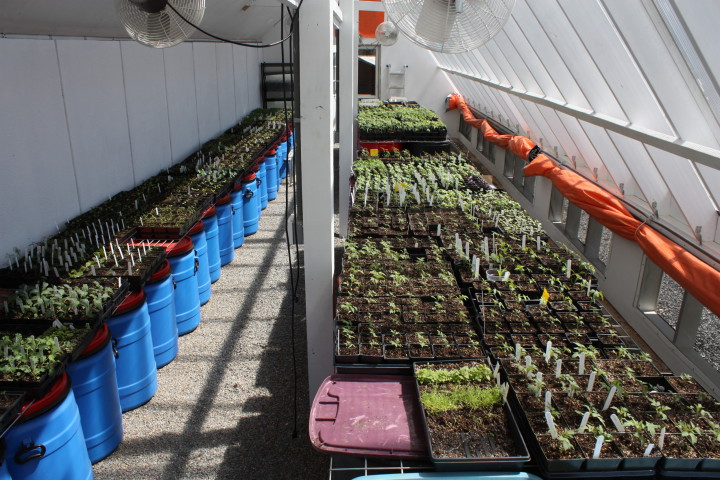The paradox of commercial greenhouses has always bothered edible landscaper Megan Riley. While the greenhouses allow professional growers to get a jump on starting seeds for food crops and landscape plantings, they require significant energy resources to operate. That means the houses aren’t necessarily sustainable, Riley says.
Riley’s longtime dream of creating a commercial-scale passive solar greenhouse for her business, M R Gardens, became a reality in January when she completed an 800-square-foot facility in Oakley. Though conservation-minded gardeners have experimented with similar structures on a small scale for at least the last 50 years, Riley says commercial producers in the nursery trade haven’t embraced the technology.

The greenhouse features large windows facing south, not just for plant growth, but also for optimal solar gain. During the day, the sun’s rays fall on large plastic drums filled with water. The drums store the heat and then release it slowly overnight, moderating temperatures inside the structure. “It’s like living next to a body of water, where the temperature fluctuations are less extreme,” Riley explains.
To keep all that heat in the building, Riley specified a high R-value for the north wall insulation. The acrylic double-walled window panels she selected also hold in more heat than single-paned glazing or plastic film. Since starting her first seeds in January, Riley hasn’t needed any supplemental heat to keep the greenhouse within the ideal growing range of 55-85 degrees, even on the coldest nights.
According to Buncombe County Cooperative Extension Agent Cliff Ruth, heating a typical greenhouse costs $4-$5 per square foot over the course of a winter. In Riley’s case, that equals a savings of $4,000 per year in heating costs. The only electricity she uses is for supplemental grow lighting for her smallest seedlings and fans to help circulate the air.
The structure’s design also prevents overheating on warm days in late spring and summer. Because the angle of the sun is higher in the sky during the warmer months, the sun’s direct rays strike the building above the slanted windows, resulting in less solar gain. Vents along the side, roof and front wall ensure adequate air circulation. “In a typical greenhouse, it can feel unpleasant to stay very long on an 80-degree day, as temperatures can easily reach above 100,” Riley says. “But we seek refuge in the comfort of the passive solar greenhouse on a hot day.”
Riley’s project, which included the purchase of 2 acres of land, is financed through the Natural Capital Investment Fund, a business loan fund for small and emerging businesses. Within a seven-state region, the fund focuses on providing capital to entrepreneurs and enterprises that are good stewards of natural resources.
While sustainability is the primary goal, the greenhouse appears to provide other benefits as well. For one thing, the plants have grown faster than Riley anticipated. Her tomato seedlings took only four to five weeks to grow large enough to plant, rather than the typical six to eight weeks. Some of the difference might be due to this year’s warm, sunny spring, but Riley also suspects that the greenhouse’s design played a role. The large amount of light entering the south-facing acrylic windows bounces off the white walls and onto the plants, bolstering their growth. The plants’ roots may also benefit from the heat radiating from the water barrels, since the barrels double as tables.
“The only challenge has been marketing the plants quickly enough,” she says with a laugh.
Riley plans to use the greenhouse primarily to grow the kinds of native perennial plants her clients want to use in their landscape designs. Before building her own nursery facility, she says, she often had to source plants from suppliers in Pennsylvania or New Jersey. Growing those varieties locally is another aspect of Riley’s pursuit of sustainability.
Though she expects to make up the difference in reduced operating costs and healthier plants, Riley estimates that her greenhouse cost three to six times more to build than a conventional facility of similar size.
Riley is offering tours of the greenhouse on Saturdays at 11 a.m. through June 18. RSVP by contacting gardens@wncmretc.com or 828-333-4151. See www.mrgardens.net for more information.



Exciting. I hope this idea spreads. Can’t wait to come see it.
Great Job!